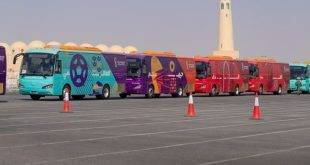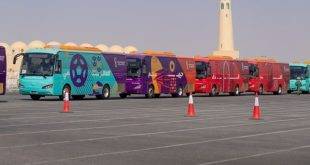The caretaker government is considering the possibility of receiving Qatari support for the transportation sector. According to information, President Najib Mikati raised the matter with Qatari officials on the sidelines of his participation in the opening of the World Cup in Doha, and it was reported that "the atmosphere is positive." It has also been learned that there was communication between the Minister of Public Works Ali Hamieh and Qatari Minister of Transport Jassim bin Ahmed Al-Sulaiti for the same purpose.
The idea originated from Doha's intention, in collaboration with FIFA, to dismantle some facilities set up for the World Cup and distribute them to several developing countries, particularly those facing difficult economic conditions. The donations will include complete football stadiums, thousands of seats that will be dismantled from other stadiums, in addition to equipment said to include large buses. The Qatari government purchased around three thousand buses, added to one thousand others already in their possession, which were used for free transportation of fans during the tournament.
According to the information, the Qataris offered to provide seats suitable for the maintenance of the sports city in Beirut and some municipal stadiums. However, the Lebanese side proposed the possibility of supplying Lebanon with a number of buses to address the transportation crisis in the country. "Al-Akhbar" learned that Mikati raised the issue with Qatari Foreign Minister Mohammed bin Abdul Rahman bin Jassim Al Thani, who manages Qatar's external investment fund along with political relations with several countries, including Lebanon. He plays a role in the current context of the presidential elections in Lebanon and communicates with various Lebanese leaders.
Mikati also sought the help of FIFA President Gianni Infantino, who is married to Lebanese Lina Ashkar and has been residing in Qatar for over two years, making efforts to learn Arabic and fostering strong ties with Qatari leadership and officials in many countries. Infantino showed willingness to assist in this matter if Qatar wishes to donate some of these buses, especially since an Arab diplomat reported that the Qatari Minister of Transport indicated that his country has a plan to utilize all the buses within a new transportation plan that considers the expected increase in the number of residents in Qatar in the coming years.
However, the more critical aspect of the issue is that Lebanon suffers not only from a shortage of buses but also from two main factors concerning the provision of fuel to operate these buses and their ongoing maintenance. Therefore, Hamieh suggested that the government allow the Ministry of Public Works to contract with the private sector to take over the operation and maintenance of the buses currently available or those that can be acquired.
In this context, sources involved in communications with the Qatari side indicated the possibility of proposing to Doha the establishment of a private Qatari company, or in partnership with Lebanese entities, which could be contracted to operate these buses, supervise their management, and establish maintenance centers, while leaving regulatory authority and planning to the Lebanese government, which would receive a portion of the revenue generated by this company.
While the laws permit such a step, it may require negotiation with private companies that own the "red permits" used by workers in the private transportation sector. The Minister of Public Works told "Al-Akhbar" that his ministry is ready to facilitate all requirements for this step if there is a serious opportunity, and he has requested relevant parties to begin drafting terms for any project contracting with the private sector. He also attempted to secure legislation allowing his ministry to contract with private companies without needing the "red permits," but the matter stalled after unionists raised concerns about the negative effects on the owners of these permits and their operators. It is noted that there are 33,000 licenses for small taxis and 6,400 licenses for buses that carry more or less than 12 passengers in Lebanon.
It is worth mentioning that about 25 years ago, private sector interests effectively disabled public transport and gained rights to operate their vehicles across all public transport lines due to deals made between ruling figures and private stakeholders. However, these companies fled the market after the 2019 collapse and are now seeking compensations despite not participating in addressing the crisis.
#### 4000 Buses for the World Cup
After announcing its hosting of the 2022 World Cup, Qatar prepared a special program to transform the transportation sector into an integrated network. It included a series of projects, including the Doha Metro, which is the largest public transport project in cities across the Middle East. The metro extends over 75 kilometers with 37 stations and three lines (red, gold, and green), alongside approximately 18,000 taxis and over 3,000 electric bicycles.
A large number of buses (operated by Karwa Transport Company) were used to transport fans attending World Cup matches, with three types of buses: "Karwa 41" (which seats 41 passengers), "Karwa 23" (which accommodates 23 passengers and is classified for VIPs), and "Karwa 39" (which can seat 39 passengers). These buses are manufactured by the Chinese companies "Yutong" and "HIGER." The Karwa Transport Company signed a contract with "Yutong" to purchase 741 electric buses and 261 diesel buses, alongside another contract with "HIGER" to acquire 1,815 diesel buses.
Khalid Kafoud, the Director of Public Relations and Communication at the Qatari company, announced the use of about 4,000 buses during the World Cup, including 850 that run solely on electricity and 1,600 buses that utilize a hybrid engine, which operates on both diesel and electricity.




